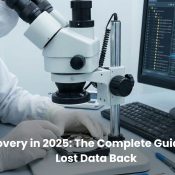How to Investigate a Digital Forensics Crime Scene in 3 Steps
How to Investigate a Digital Forensics Crime Scene in 3 Steps
How to Investigate a Digital Forensics Crime Scene in 3 Steps
Introduction: What is Digital Forensics?
Digital forensics is the process of investigating digital media for evidence. It can be used to investigate a wide range of crimes, such as theft, fraud, identity theft and embezzlement.
Digital forensics can be used to find out who did what on a computer and when they did it. It can also tell us what was done on the computer and how it was done.
The digital forensics investigation process has four steps:
1) Preservation: This step is all about making copies of the data on the hard drive or other digital storage medium before any changes are made to it.
2) Collection: This step is all about collecting data from devices such as computers and cell phones that could have evidence stored on them.
3) Examination: In this step, investigators will analyze the collected data for clues or evidence that could help with their case.
4) Reporting: In this final step, investigators will summarize their findings in a report for law
Digital Crime Scene Investigation in 3 Steps
Step One: Find the Data
Data is the most important asset of any company. This is why it’s crucial for companies to have a clear data strategy. In order to find the data, you need to know what data you are looking for, where it’s coming from and how much of it needs to be collected.
Step Two: Collect Exhibits and Evidence
Police officers use different methods to collect evidence, but the most common one is to request a search warrant. This means that they need to provide a judge with enough information for him or her to issue a warrant.
The judge will want to know about the alleged crime and why the police officer needs access to specific information. The officer will then have to provide the judge with all of the exhibits and evidence collected so far.
Step Three (and Most Important): Analyze Evidence and Conclusions
Forensic analysis is a method of analyzing digital evidence to identify any patterns or anomalies that may be relevant to the case.
The first step in forensic analysis is to identify the type of data that needs to be analyzed. The second step is to determine what type of forensic analysis technique needs to be used in order for the analyst to get the best results.
The third and most important step in forensic analysis is analyzing evidence and conclusions. One must analyze all of the evidence and come up with a conclusion based on all of this information.
Conclusion and Takeaways from this Case Study – How to Investigate a Digital Crime Scene in Steps
Investigating a digital crime scene is not an easy task. It takes a lot of skills and knowledge to perform such an investigation. However, there are 4 steps that can be followed in order to investigate the crime scene.
The first step is to gather all the necessary information about the incident and the victim. This includes personal details, social media accounts, email accounts, text messages and mobile phone records. The second step is to identify any suspects who might have committed the crime and their digital footprint. Next, you should try to recover deleted data from any devices or computers that were used during the incident or in relation to it. The fourth step is to investigate any links between the suspect and victim on social media sites like Facebook or Instagram. After this you should find out if there are any other suspects in connection with this case by identifying their digital footprints as well as investigating their online activity on social media sites like Facebook or Instagram etcetera.
How do you become a Digital Forensics Expert?
Digital forensics is the process of examining digital information for legal or law enforcement purposes. The field has been around for a long time, but it is still evolving.
There are several ways to become a digital forensics expert. You can take formal courses and earn an undergraduate or graduate degree in the field. You can also learn on the job by working as an intern in a digital forensics lab and gaining experience that way.
You have got to have the hunger. Digital forensics is not just what I do, it’s who I am’
This section is about how digital forensics has become a part of one’s identity. Digital forensics is not just what they do, it’s who they are.
The world has changed and so has the way people live in it. There are many things that we can’t do without the internet, and that includes our daily lives.
1. Firstly, it would be good to get a little bit of background on yourself, as a person, and how you got into working in digital forensics?
I became interested in digital forensics when I started taking courses in programming. I felt it was a natural progression to take classes in computer forensics and digital evidence investigations.
2. Did you do any studying alongside working?
I studied alongside working for the first few years of my career. This allowed me to gain valuable experience in a different setting which I would not have gotten otherwise.
4. How do you manage learning alongside your job?
Balancing work and education can be difficult. It’s important to plan your schedule accordingly and set goals so you’re not overwhelmed by the number of tasks you need to complete.
5. Do you think that this passion and hunger is a necessary characteristic that digital forensicators should possess?
Digital forensicators are responsible for the preservation, identification, extraction, analysis, and reporting of digital media found in criminal investigations. Digital evidence can be found on a variety of devices such as computers and cell phones to name a few. It is important that these professionals possess the aforementioned passion and hunger so that they can achieve success in this field.
6. Do you think there is a current skills gap in DFIR? If so, can you talk to us a little bit about why?
There is currently a skills gap in DFIR, but I believe that there’s also a need for more people to be interested in the field. Most of the people who are in the tech industry are more interested in developing apps and games than they are with solving crimes. This is because DFIR is seen as a less-glamorous job. One way to combat this lack of interest is by giving
7. Do you see a rising need in digital forensics and incident responder experts?
With the increase in cyber attacks and data breaches, the need for digital forensics and incident responders has risen. With recent breaches at companies like Uber & Equifax, it is becoming clear there is a need for qualified individuals to investigate these types of incidents.
8. Is there any particular trends you see around the world with cyber security experts moving into digital forensics?
Cyber security experts are becoming more and more in demand. The increased cyber-attacks and data breaches have led to a significant shortage of professionals. There is also a shortage of training and development for new cyber security experts for this field.
9. Is there any particular ‘hurdle’ that readers should be aware of if they are considering moving into digital forensics?
Digital forensics is a burgeoning field with a bright future. It’s being used to identify hackers, fraudsters, and even terrorists. The field is evolving so quickly that it’s hard to keep up with the latest developments. There are different types of digital investigations, including data extraction and computer hacking, which means that no two jobs are alike.
In Need Of Digital Forensics Experts Services?
All Categories
- Backup
- BUSINESS EMAIL COMPROMISE ATTACKS
- Cloud back up services in Kenya
- Cloud Computing
- Computer Forensics
- Cyber Attacks
- Data Loss
- Data Recovery
- Data Recovery Contacts
- Data Recovery Cost
- Data Recovery In Mombasa
- Data recovery in Nairobi
- Data recovery in South Sudan
- Data recovery in Uganda
- Data Recovery Kenya
- Data Recovery Rwanda
- Data RecoveryKenya
- Database Recovery
- Design
- Desktop Recovery
- DIGITAL FORENSIC LABORATORY(DFL)
- Digital Forensics
- Digital Forensics Kenya
- Digital Photo Data Recovery
- Email Data recovery
- Hacking
- hardriver Recovery
- Laptop Data recovery
- Mobile Data recovery
- Network and Security Services
- Phone Data Recovery
- Raid Data recovery
- Raid Recovery In Kenya
- Ransomware
- Ransomware Attacks
- Ransomware Removal Services
- Server Recovery
- Services
- Technology
- Uncategorized
- Virtual PBX Cloud Services
- Virus & Malwares




